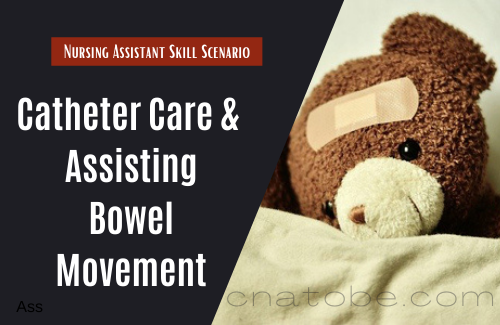
Patients or nursing home residents who have indwelling catheter need a lot of extra care from the nursing assistants. Because the catheter is attached to their body their movement is limited. The catheter needs to be cleaned daily and of course you have to take care of the person’s personal needs too.
Nursing Assistant Skill Scenario: Urinary Catheter Care & Assisting Bowel Movement
Our nursing assistant online class teacher has given us this scenario about urinary catheter care and assisting bowel movement.
Read the scenario below. . .
Michelle Sumpter is a 78-year-old woman. She has returned to the health care center from the hospital where she had surgery for a fractured hip. Michelle is incontinent of urine, and comes back with an indwelling urinary catheter that will remain in place until her incision heals. You are assigned to care for her.
1. What are your responsibilities for the care and management of this urinary drainage device?
2. What observations regarding urinary elimination will you make while caring for Michelle?
3. What type of bedpan should she use for bowel movements?
Response and Discussion
Here are my responses to the scenario. . .
1. What are your responsibilities for the care and management of this urinary drainage device?
My responsibilities for the care and management of Michelle’s urinary drainage device include:
- To give daily catheter care, clean the area around the urethral opening, and empty the drainage bag. Keeping the perineal/genital area clean prevents infection because the catheter goes all the way into the bladder, where bacteria can enter the bladder more easily. I will be careful not to tug or pull on the catheter
- I will make sure that the drainage bag always hangs lower than Michelle’s hips or bladder. Urine must never flow from the bag or tubing back into the bladder which can cause infection.
- Keep the drainage bag off the floor. I will make sure the catheter tubing does not touch the floor.
- Keep the tubing as straight as possible. Tubing should not be kinked so that the urine can flow freely.
- Emptying the catheter drainage bag. The graduate must be placed on top of the paper (on the floor). I will make sure the clamp or spout won’t touch the graduate while emptying.
- Document my observation and report to the nurse any changes of the resident.
2. What observations regarding urinary elimination will you make while caring for Michelle?
Here are the observations that I need to record or report:
- Michelle’s complaints of pain or pressure
- Blood in the urine
- Cloudy urine
- Particles in the urine
- Color of the urine
- Odor of the urine
- Catheter bag does not fill after several hours
- Catheter bag fills suddenly
- Catheter is not in place
- Urine leaks from the catheter
3. What type of bedpan should she use for bowel movements?
I would have her use a fracture bedpan, which is designed specifically for patients who have had a hip fracture or are recovering from hip replacement or having a lower extremity fracture.
